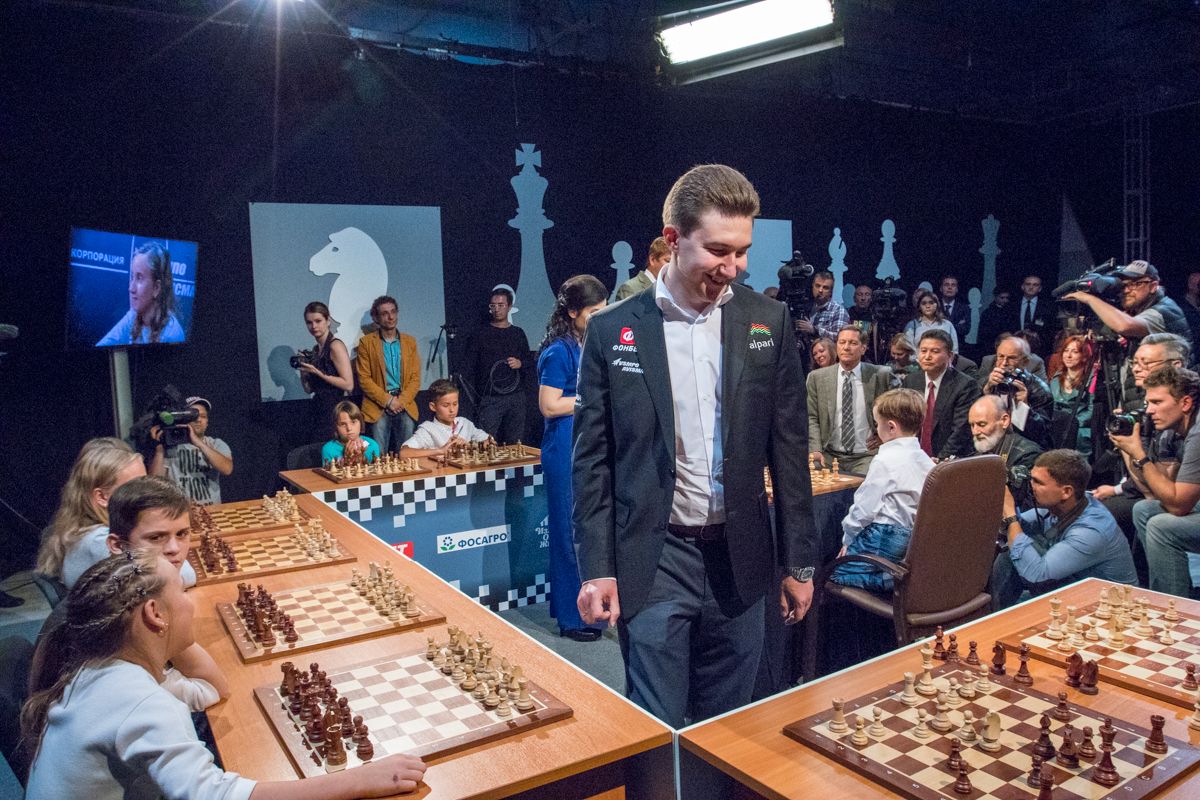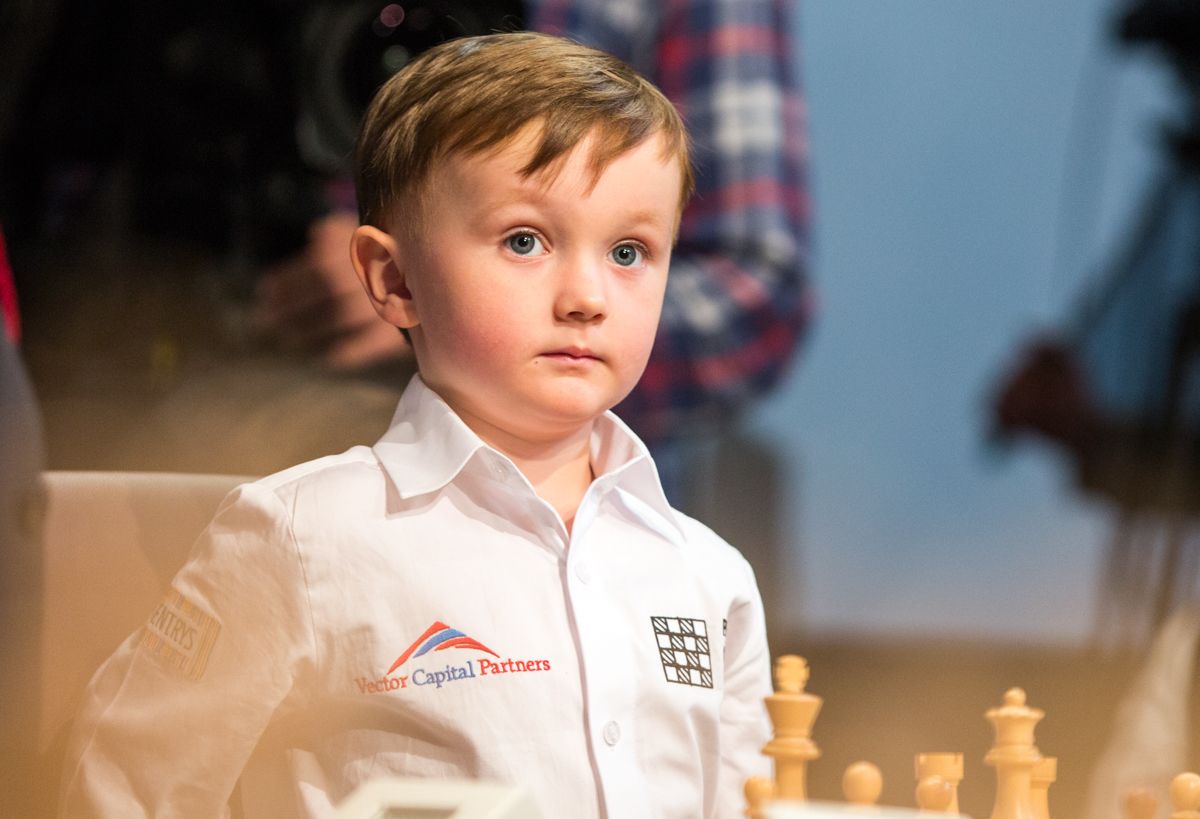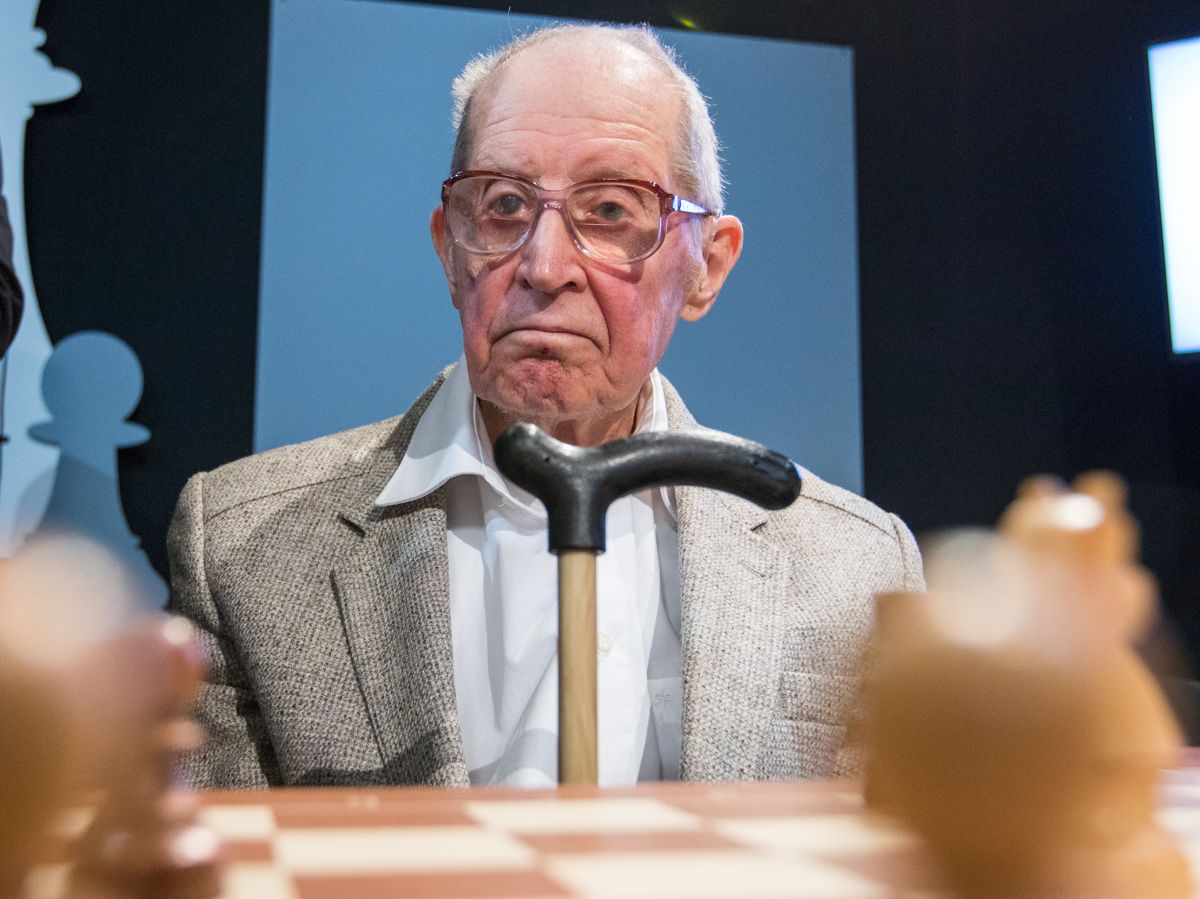
Misha Osipov vs. Averbakh (95) | 4-Year-Old Plays World's Oldest GM
Last Tuesday, a small chess festival was held at the famous Ostankino tower in Moscow. Among the participants were chess legends Boris Spassky and Yuri Averbakh, but also Sergey Karjakin and Russia's latest star, Misha Osipov.
Maria Emelianova reports, with text and photographs.
On the occasion of the 50th birthday of Moscow's famous radio and television tower Ostankino, a special chess program was broadcast, with the support of the "Change One Life" Foundation.
Sergey Karjakin gave a small simultaneous exhibition, but the highlight of the evening was the match between the world's oldest grandmaster, Yuri Averbakh (95), and four-year-old Misha Osipov.
Also, a match was played in paired chess, where Karjakin and Osipov beat Averbakh and his team member, Alexander Zhukov. The latter is the first deputy chairman of the State Duma of the Russian Federation and the President of the Russian Olympic Committee.
Honorary guests of the evening were the 10th world champion Boris Spassky and the FIDE president Kirsan Ilyumzhinov.
The event was hosted by the famous sports commentator Dmitry Guberniev and the TV and radio host (and chess journalist) WGM Elmira Mirzoeva.
An atmosphere video from Chess.com's Russian YouTube channel.
While waiting for the evening to take off, two chess legends Boris Spassky and Yuri Averbakh sat at the board, and the oldest GM showed some interesting positions to solve. We will show you three of the most interesting ones.
This one is probably the most beautiful, according to Sergey Karjakin:
Threatening mate on h6 or winning a rook due to a pin, the white queen uses staircase moves to reach f6 and force Black to queen on a1, then the queen goes back using the same technique all the way to f6 to win with a zugzwang. Amazing!
The next one is much simpler: Black obviously needs to capture the only one ace in White's position: a passed pawn. But how to do this?
Another beauty: normally queen and knight vs queen is a draw, but not here. White uses the badly positioned black queen by zugzwang! How often do you see a king move as the highlight of such a position?

A full house for the chess day in Moscow.

FIDE president Kirsan Ilyumzhinov with hosts of the show, WGM Elmira Mirzoeva and the most famous Russian sports commentator, Dmitry Guberniev.

The 10th world chess champion, GM Boris Spassky.

GM Yuri Averbakh, at 95, still shows phenomenal memory and a bright mind. Almost unable to see the board due to his significantly decreased vision, he still managed to win a piece and completely dominate the position. Sadly, he dropped a rook as he didn't clearly see the move of the young opponent.

Misha Osipov (four) said that the most important thing is not to win, but to make strongest moves and not to blunder.

Although there were some blunders, Misha was not the one to make the last mistake.

Meanwhile, Sergey Karjakin won all his games against the kids from foster families. The event was supported by the "Change One Life" Foundation.

Chess is fun!

Boris Spassky tells a story about the Swedish king Karl XII, whose army was surrounded by Turks, and therefore he had to fight the enemy face-to-face. When the host said to Boris, "You are telling this story like you were there!", the champion joked, "Of course, I knew Karl very well!"
The next part of the show was "pair play" on two boards: the move made by either color on the first board is repeated on the second one, and then the first board repeats after the second one. Zhukov had played before on Karjakin's team, and they even won the Moscow championship in this discipline, but this time they were on the opposite sides: Misha was teamed with Sergey, while Zhukov had to read Averbakh's mind.

Alexander Zhukov, next to Kirsan Ilyumzhinov.
After a couple of passive moves, the team of the younger generation found itself in a difficult situation, so Sergey decided to take a gamble and sacrifice a piece.
Misha: "Why did he give up a bishop?"
Two moves later, Misha understood the world blitz champion's idea, and so the team won a queen and the game.

Osipov, already playing with a sponsored shirt, didn't immediately see Karjakin's idea.

Sergey, unhappy with the position, decided to muddle the water with 19.Bxd5?!

Young generation's advice to the youngest: "Play better chess, and you won't need to sacrifice!"

Averbakh has troubles with his sight, but his mind is still sharp.
Yuri Lvovich still actively supports the chess movement in the country. Despite his age, he works (!) in the Russian National Public Library for Science and Technology, where he helps preparing chess coaches. "Of course, it's my job. It's a pity that Garry [Kasparov] left chess and decided to choose politics instead of chess books and chess propaganda. It's our mission to do this," he said.
Averbakh, reached after the event, discussed his chess memories.
"I was always the one to tell anecdotes, not because I was trying to remember them, but because they were written to my memory instantly," Averbakh said. "I have a so-called 'emotional memory:' I was always remembering the events connected to some strong emotion. Anecdotes lead to laughing, so it was easy for me to remember them.
"In 1947, master [Benjamin] Blumenfeld, when was going to defend his Ph.D. dissertation, [had] done some chess experiments on me, and this is when we discovered this phenomenon. During Blumenfeld's research, I was going back to my 1939 Moscow championship, and we found out that all the games with sacrifices and a lot of emotional stress I remembered perfectly, while maneuvering and long fight were harder to recall."

Averbakh revealed that he has excellent "emotional memory."
Averbakh continued: "I was blessed to live in the golden age of chess. It was the 1945 USA-USSR radio-match that opened great traveling opportunities for Soviet players. I remember that American grandmaster Denker told me that Americans were expecting the match to end with a small margin, while they were reigning four-time world champions. By the way, I was working as a controller at this match. Our crushing victory turned everything around: Soviet chess players were participating abroad, and even the second place was considered a failure. As an outcome, Botvinnik became the world champion.
"There are many opinions on the Soviet power, but thanks to it, the sport became very important in the country. The Highest Soviet of Physical Culture was established by Krylenko, and international tournaments of 1925, 1935, and 1936 took place in Moscow under his patronage."
These days it is less known that Averbakh was also an arbiter at many top events. Asked which were the most memorable, he replied: "I remember the match of Kasparov vs Short, where I met Princess Diana. And the match Ponomariov-Ivanchuk, where 12-year old Sergey was helping Ruslan."